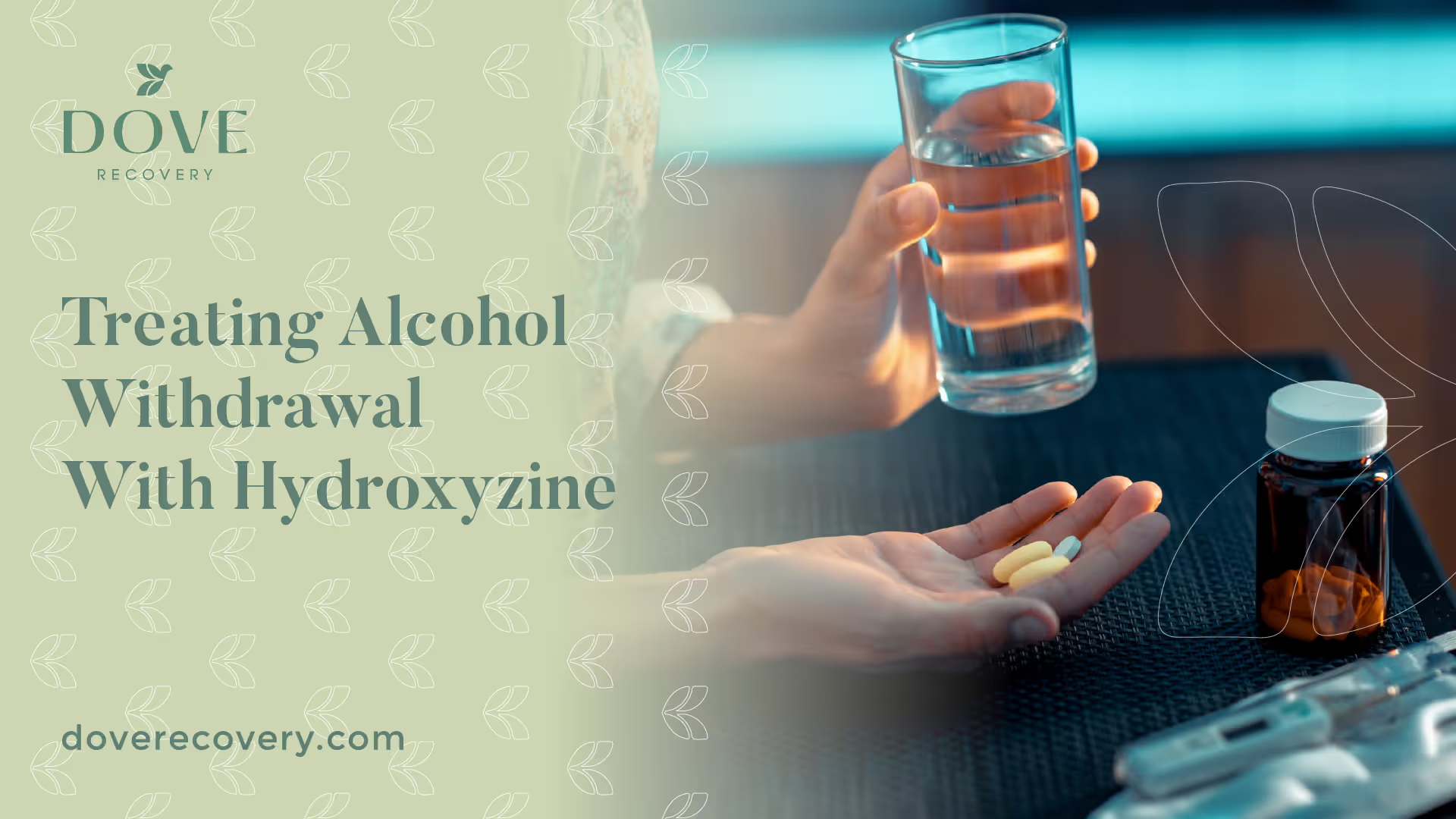Treating Alcohol Withdrawal With Hydroxyzine


Alcohol withdrawal can be a painful and dangerous experience for those struggling with alcohol addiction. Symptoms can range from mild anxiety and tremors to seizures and delirium tremens. While there are several medications used to treat alcohol withdrawal, one that has gained popularity in recent years is hydroxyzine.
What is Hydroxyzine?
Hydroxyzine is a medication that is typically used to treat anxiety, itching, and nausea. It works by blocking a certain natural substance in the body (histamine) that causes allergic symptoms. However, it has also been found to be effective in treating alcohol withdrawal symptoms.
How Does Hydroxyzine Help With Alcohol Withdrawal?
Hydroxyzine helps to alleviate the symptoms of alcohol withdrawal by reducing anxiety and promoting relaxation. It can also help to prevent seizures and delirium tremens, which can be life-threatening in severe cases of alcohol withdrawal.
How is Hydroxyzine Used for Alcohol Withdrawal?
Hydroxyzine is typically prescribed in a hospital or detox setting, where patients can be closely monitored. It is usually given orally, with a starting dose of 25 mg up to four times a day. The dosage can be adjusted based on the patient's response and the severity of their symptoms.
Potential Risks of Using Hydroxyzine for Alcohol Withdrawal
While hydroxyzine can be an effective treatment for alcohol withdrawal, it is important to be aware of the potential risks associated with its use. One major risk is drug interactions. Hydroxyzine may interact with other medications a patient is taking, such as antidepressants or sedatives, which can result in adverse effects.
Another risk to consider is the possibility of allergic reactions. Some patients may have an allergic reaction to hydroxyzine, which can cause symptoms such as difficulty breathing, hives, and swelling of the face or throat. If a patient experiences any of these symptoms while taking hydroxyzine, they should seek medical attention immediately.
It is also important to note that hydroxyzine can cause drowsiness and impair cognitive function. Patients should avoid driving or operating heavy machinery while taking hydroxyzine for alcohol withdrawal.
As with any medication, it is important for patients to discuss their medical history and current medications with their healthcare provider before starting treatment with hydroxyzine for alcohol withdrawal. By doing so, they can minimize the potential risks and ensure that this treatment option is safe and effective for them.
Hydroxyzine vs. Benzodiazepines for Alcohol Withdrawal
Benzodiazepines are another class of medications commonly used to treat alcohol withdrawal symptoms. They work by enhancing the activity of a neurotransmitter in the brain called GABA, which helps to reduce anxiety and promote relaxation.
While benzodiazepines have been used for many years to treat alcohol withdrawal, they also carry a risk of abuse and dependence. In contrast, hydroxyzine is not considered addictive and has a lower potential for abuse.
Additionally, benzodiazepines can cause significant side effects such as drowsiness, confusion, and impaired coordination. These side effects can be particularly dangerous in older adults or those with pre-existing medical conditions.
However, benzodiazepines may be more effective than hydroxyzine in treating severe cases of alcohol withdrawal that involve seizures or delirium tremens. In these cases, the benefits of using benzodiazepines may outweigh the risks associated with their use.
Ultimately, the choice between hydroxyzine and benzodiazepines for treating alcohol withdrawal will depend on several factors including the severity of symptoms, patient history and preferences, and potential risks and benefits associated with each medication. It is important for patients to discuss their options with their healthcare provider to determine the best course of treatment for their individual needs.
Onset and Duration of Hydroxyzine for Alcohol Withdrawal
While hydroxyzine can be an effective treatment for alcohol withdrawal symptoms, it's important to understand when the medication will start working and how long its effects will last.
Hydroxyzine is typically taken orally, with a starting dose of 25 mg up to four times a day. The medication is quickly absorbed into the bloodstream, with peak concentrations reached within one to two hours after administration.
Patients can expect to experience the calming effects of hydroxyzine within 30 minutes to one hour after taking the medication. These effects can last anywhere from four to six hours, depending on the patient's response and the severity of their symptoms.
It's important for patients to take hydroxyzine as prescribed by their healthcare provider in order to achieve optimal therapeutic benefits. If a patient experiences any adverse effects or if their symptoms persist despite treatment with hydroxyzine, they should consult their healthcare provider immediately.
Tapering Off Hydroxyzine After Alcohol Withdrawal
Once a patient's alcohol withdrawal symptoms have subsided, it may be time to start tapering off hydroxyzine. Tapering off involves gradually reducing the dosage of the medication over a period of time in order to avoid withdrawal symptoms or other adverse effects.
The tapering process should always be supervised by a healthcare provider to ensure that it is done safely and effectively. The duration of the tapering process will depend on several factors such as the length of treatment, the dosage used, and the patient's response.
In general, patients should expect to reduce their dosage by about 25% every few days until they are no longer taking hydroxyzine. This gradual reduction can help to minimize any potential withdrawal symptoms such as anxiety, insomnia, or nausea.
It's important for patients to communicate with their healthcare provider throughout the tapering process in order to monitor for any adverse effects and adjust the dosage as needed. By following a proper tapering schedule, patients can safely discontinue hydroxyzine treatment without experiencing any negative consequences.
Are There Any Side Effects of Hydroxyzine?
Side effects of hydroxyzine may include:
- Drowsiness
- Dizziness
- Dry mouth
- Blurred vision
In rare cases, hydroxyzine may cause a fast or irregular heartbeat, which should be reported to a healthcare professional immediately.
Potential Long-Term Effects of Using Hydroxyzine for Alcohol Withdrawal
While hydroxyzine has been found to be an effective treatment for alcohol withdrawal symptoms, there is limited research on its long-term effects. As a result, it is important for patients and healthcare providers to consider the potential risks associated with prolonged use of hydroxyzine.
One potential long-term effect of using hydroxyzine is liver damage. The liver plays a crucial role in metabolizing medications and removing toxins from the body. Prolonged use of hydroxyzine can put stress on the liver, potentially causing damage over time.
Another concern with long-term use of hydroxyzine is the risk of cognitive impairment. Studies have shown that chronic use of antihistamines like hydroxyzine can cause cognitive decline, particularly in older adults. This can lead to problems with memory, attention, and other cognitive functions.
Lastly, prolonged use of hydroxyzine may also lead to physical dependence or addiction. While hydroxyzine is not considered addictive in the same way as benzodiazepines or opioids, patients who take the medication for extended periods may develop a tolerance to its effects and require higher doses to achieve the same level of relief.
It is important for patients and healthcare providers to weigh these potential risks against the benefits of using hydroxyzine for alcohol withdrawal treatment. In some cases, alternative medications or therapies may be more appropriate for long-term management of alcohol addiction.
Seeking Medical Attention for Alcohol Withdrawal
While it may be tempting to attempt to detox from alcohol at home, it is important to seek medical attention when experiencing alcohol withdrawal symptoms. Alcohol withdrawal can be a serious and potentially life-threatening condition, especially in cases of severe addiction.
By seeking medical attention, patients can receive the necessary support and care to manage their symptoms safely and effectively. Healthcare providers can also monitor for any potential complications that may arise during the detox process.
Attempting to detox from alcohol at home without medical supervision can lead to a number of risks and complications. For example, sudden cessation of alcohol use can cause seizures or delirium tremens in some individuals. These conditions require immediate medical attention in order to prevent further harm or complications.
In addition, attempting to detox at home can increase the risk of relapse. Without proper support and treatment, patients may struggle to manage their symptoms effectively and may resort back to alcohol use as a way of coping with their withdrawal symptoms.
Overall, seeking medical attention for alcohol withdrawal is critical for ensuring patient safety and achieving successful outcomes. By working with healthcare providers, patients can receive the necessary care and support needed to overcome their addiction and achieve lasting recovery.
Using Hydroxyzine in Combination with Other Treatments for Alcohol Addiction
While hydroxyzine can be an effective medication for treating alcohol withdrawal symptoms, it is important to note that it is not a standalone treatment for alcohol addiction. In order to achieve lasting sobriety, individuals must also receive therapy and participate in support groups.
One common therapy used to treat alcohol addiction is cognitive-behavioral therapy (CBT). This type of therapy helps individuals identify and change negative thought patterns and behaviors that contribute to their addiction. By learning new coping skills and strategies, individuals can better manage their triggers and avoid relapse.
Support groups such as Alcoholics Anonymous (AA) can also be incredibly helpful for those struggling with alcohol addiction. These groups provide a safe and supportive environment where individuals can share their experiences and receive guidance from others who have gone through similar struggles.
When used in combination with therapy and support groups, hydroxyzine can help individuals manage their withdrawal symptoms more effectively. By reducing anxiety and promoting relaxation, hydroxyzine can help individuals stay focused on their recovery goals without being distracted by uncomfortable physical symptoms.
It's important to work closely with healthcare providers when using hydroxyzine in combination with other treatments for alcohol addiction. By developing a comprehensive treatment plan that addresses each individual's unique needs, healthcare providers can help patients achieve lasting sobriety and improve their overall quality of life.
Managing Common Side Effects of Hydroxyzine
While hydroxyzine can be an effective treatment for alcohol withdrawal symptoms, it can also cause some side effects. Some common side effects of hydroxyzine include dry mouth and dizziness.
Fortunately, there are several tips that individuals can use to manage these side effects. For example, drinking plenty of water and chewing sugar-free gum or sucking on sugar-free candy can help to alleviate dry mouth. It may also be helpful to avoid caffeine and alcohol, as these substances can further dehydrate the body.
Dizziness can also be managed by taking precautions such as rising slowly from a sitting or lying position, avoiding sudden movements, and avoiding activities that require balance or coordination until the dizziness subsides.
It's important for individuals to communicate with their healthcare provider if they experience any side effects while taking hydroxyzine. In some cases, dosage adjustments or alternative medications may be recommended in order to minimize these side effects and ensure optimal therapeutic benefits.
Conclusion
Hydroxyzine is a medication that has been found to be effective in treating alcohol withdrawal symptoms. It works by reducing anxiety, promoting relaxation, and preventing seizures and delirium tremens. While it can cause side effects, it is generally safe when used under the supervision of a healthcare professional. If you or someone you know is struggling with alcohol addiction and is experiencing withdrawal symptoms, speak with a healthcare professional to determine if hydroxyzine may be a viable option for treatment.
Sources:
- https://www.webmd.com/drugs/2/drug-3775/hydroxyzine-hcl-intramuscular/details
- https://www.ncbi.nlm.nih.gov/pmc/articles/PMC2947546/
- https://alcoholawareness.org/does-hydroxyzine-help-with-alcohol-withdrawal/
